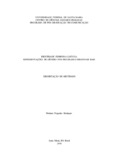| dc.creator | Henriques, Mariana Nogueira | |
| dc.date.accessioned | 2016-08-10 | |
| dc.date.available | 2016-08-10 | |
| dc.date.issued | 2016-03-16 | |
| dc.identifier.citation | HENRIQUES, Mariana Nogueira. GAUCHA FEMALE IDENTITY:
REPRESENTATIONS OF GENDER IN THE REGIONAL PROGRAMS BAH!. 2016. 139 f. Dissertação (Mestrado em Comunicação) - Universidade Federal de Santa Maria, Santa Maria, 2016. | por |
| dc.identifier.uri | http://repositorio.ufsm.br/handle/1/6370 | |
| dc.description.abstract | This research discusses which senses about the identity of the gaucha women are mobilized by RBS TV, from the special programs "Bah! A very gaucho program", Bah! I Am from the South" and "Bah! A very special fandango", shown on September 20th 2013 and 2014 and on September 19th 2015, respectively. The main objective is to analyze the ways in which the senses about the gaucha women are produced, which contribute to the construction and representation of this identity. The specific objectives are: to verify the production conditions that contribute to build this identity in the programs; recognize the elements used by RBS TV to represent the female characters of the program; identify the discourses used by RBS TV in Bah! for the representation of the gaucho identity, particularly the identity of the woman; and characterize the identity processes that update the representation of contemporary gaucho from the identity of the woman. For this purpose, by developing an own methodological model, from the perspective of the cultural studies, we conducted a cultural media analysis to observe our object through three main instances: television making, textual products and the context in which it appears. From the research we infer that the three main senses: concealment, objectification and masculinization form a stereotypical female identity. Also, we realize that the special programs follow the intention of perpetuating a hegemonic masculine identity transmitting a false idea of female empowerment, seeking to generate audience and recognition. | eng |
| dc.description.sponsorship | Coordenação de Aperfeiçoamento de Pessoal de Nível Superior | |
| dc.format | application/pdf | por |
| dc.language | por | por |
| dc.publisher | Universidade Federal de Santa Maria | por |
| dc.rights | Acesso Aberto | por |
| dc.subject | Identidade feminina | por |
| dc.subject | Representação | por |
| dc.subject | Programa televisivo regional Bah | por |
| dc.subject | Estudos culturais | por |
| dc.subject | Gênero | por |
| dc.subject | Female identity | eng |
| dc.subject | Representation | eng |
| dc.subject | Regional TV program Bah | eng |
| dc.subject | Cultural studies | eng |
| dc.subject | Gender | eng |
| dc.title | Identidade feminina gaúcha: representações de gênero nos programas regionais Bah! | por |
| dc.title.alternative | Gaucha female identity: representations of gender in the regional programs Bah! | eng |
| dc.type | Dissertação | por |
| dc.description.resumo | A presente pesquisa problematiza quais os sentidos sobre a identidade da mulher gaúcha são mobilizados pela RBS TV, a partir dos especiais Bah! Um programa muito gaúcho , Bah! Eu Sou do Sul e Bah! Um fandango muito especial , exibidos em 20 de setembro de 2013 e 2014 e 19 de setembro de 2015, respectivamente. O objetivo central é o de analisar os modos como são produzidos os sentidos sobre a mulher gaúcha, que contribuem para a construção e representação desta identidade. Como objetivos específicos temos: verificar as condições de produção que contribuem para a configuração desta identidade nos programas; reconhecer os elementos utilizados pela RBS TV para representar as personagens femininas do programa; identificar os discursos utilizados pela RBS TV, em Bah! para a representação da identidade gaúcha, em especial da identidade da mulher; e caracterizar os processos identitários que atualizam a representação do gaúcho contemporâneo a partir da identidade da mulher. Para isso, através da elaboração de um modelo metodológico próprio, com base na perspectiva dos estudos culturais, realizamos uma análise cultural-midiática para observar nosso objeto através de três grandes instâncias: o fazer televisivo, os produtos textuais e o contexto em que está inserido. Da pesquisa inferimos que os três principais sentidos: ocultamento, objetificação e masculinização formam uma identidade feminina estereotipada. Além disso, percebemos que os especiais atuam na intenção de perpetuar uma identidade hegemônica e masculina transmitindo uma falsa ideia de empoderamento feminino, na busca por gerar audiência e reconhecimento. | por |
| dc.contributor.advisor1 | Lisbôa Filho, Flavi Ferreira | |
| dc.contributor.advisor1Lattes | http://lattes.cnpq.br/9962424591141586 | por |
| dc.contributor.referee1 | Baptista, Maria Manuel Rocha Teixeira | |
| dc.contributor.referee1Lattes | http://lattes.cnpq.br/9424593531797970 | por |
| dc.contributor.referee2 | Dalmolin, Aline Roes | |
| dc.contributor.referee2Lattes | http://lattes.cnpq.br/7869463407801702 | por |
| dc.creator.Lattes | http://lattes.cnpq.br/4361936721056339 | por |
| dc.publisher.country | BR | por |
| dc.publisher.department | Comunicação | por |
| dc.publisher.initials | UFSM | por |
| dc.publisher.program | Programa de Pós-Graduação em Comunicação | por |
| dc.subject.cnpq | CNPQ::CIENCIAS SOCIAIS APLICADAS::COMUNICACAO | por |


